|
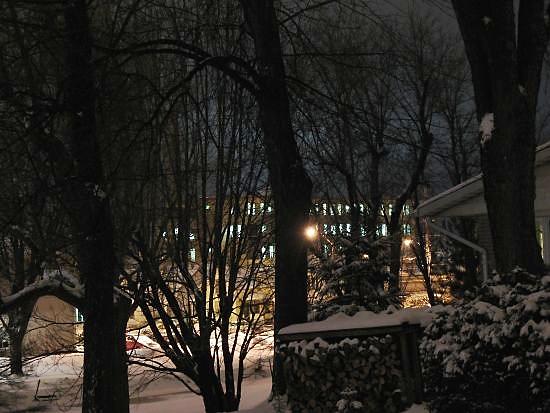
photo - mw
_______________________
Letters to a Middle-Aged Poet
Michael Gottlieb(....)
5.
What are we supposed to do now?
Do we try and hop aboard those fast-moving freights? Do we claim that we too are one of them, that we are card carrying members of their movements – we’re with them and just like them – and always have been (even before they were conceived of), or does that make us seem ridiculous? And, if we do not try and sport those ill-fitting skinny jeans and pork pie hats and (for those of us capable of sprouting same) that artfully curated facial hair – what indeed is left for us?
If we can’t be one of them, can’t carry that off, are we obliged to ask ourselves: why bother writing at all anymore?
6.
What if our reaction to all that is going on around us is not some cringe-worthy, pathetic attempt to climb aboard an express that has left the station several decades after we had our own tickets once and forever punched, but, instead, something else?
Perhaps our posture should be one of welcoming. Maybe we should be able to get it together to write some positive criticism, a supportive review or two. We could even assume, or presume, the mantle of a champion. Let’s not dismiss such a possibility out of hand. But what if the reaction, our reaction, is different? Speciously curmudgeonly? Angry, vexatious, rejectionist? What if our response is a frankly hostile, knee-jerk dismissal of whatever it is that naturally – some might say – quite naturally, comes after what we ourselves in our youth, in our own day, served up to the world?
...(more)
Otoliths 24
the southern summer issue
Editor: Mark Young
_______________________
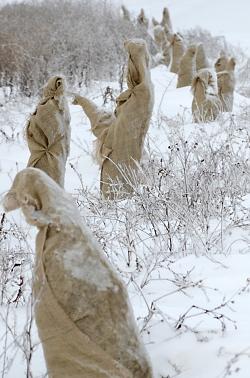
Winter Wrapped Trees
© of Karen McRae
Karen McRae
via Steve Himmer
_______________________
The Bicameral Eyeball
John Ashbery
boston review
No one noticed that it was midnight out.
The tools to make the tools were forthcoming.
It wasn’t so much that we were afraid of farting
as that other thieves had gotten wind of his maladdress.
She was startling in her new headdress.
Oodles of trolls performed the funeral litany—
hey, it wasn’t their turn at the foc’sle, so why
be perturbed ahead of time, and too late? The factory
whistle blew and released all the workers inside
who came crowding down along the pavement.
As though walking on stilts people blew up in amazement
like pieces of trash a wind desultorily lifts,
then returns for no visible reason. We were all tired
and happy, plodders on life’s great thoroughfare.
None of us were in it for the long haul, but paradoxically
all of us were, we just didn’t know it yet. ...
...(more)
_______________________
The Daily Digital Lock Dissenter: The Series To Date
Michael Geist
Distinguishing Friend from Foe in the Intellectual Property Debate
Mat Callahan
Socialism and Democracy
_______________________
How Apple Can Solve Its China Problem
Mike Elgan
Apple is on the brink of becoming the poster child for worker abuse. Journalists and rights organizations are starting to draw attention to the enormous contrast between Apple’s quarterly billions in profits, and the desperate plight of abused workers in China.
And the closer you look, the uglier this issue gets. And it threatens to damage Apple’s long-term prospects for continued growth and success.
Here’s the problem, and also what Apple can do about it....(more)
.....................................................
"If goods and capital can move freely from country to country, and people cannot, then people are and always will be slaves to goods and capital. We as a global society will not solve our Apple problem until people are free to live and work where they choose."
-
Stephen Downes
_______________________

circa 1980
Francesca Woodman
1958-1981
at the Tait
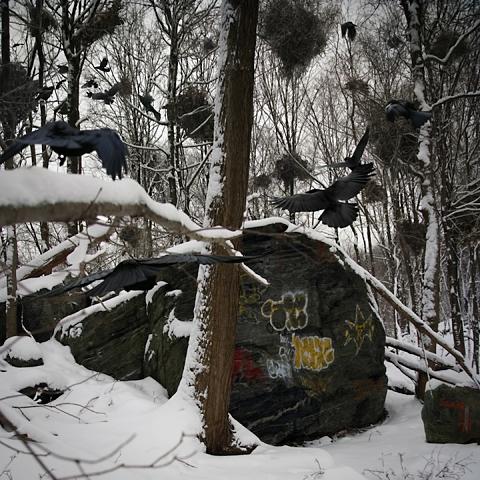
Strange Dreams and Haunting Nightmares
(14 photos)
Anthony Goicolea
_______________________
from
Echo's Bones
Samuel Beckett
Serena II
this clonic earth
see-saw she is blurred in sleep
she is fat half dead the rest is free-wheelinf
part the black shag the pelt
is ashen woad
snarl and howl in the wood wake all the birds
hound the harlots out of the ferns
this damfool twilight threshing in the brake
bleating to be bloodied
this crapulent hush
tear its heart out
in her dreams she trembles again
way back in the dark old days panting
in the claws of the Pins in the stress of her hour
the bag writhes she thinks she is dying
the light fails it is time to lie down
Clew Bay vat of xanthic flowers
Croagh Patrick waned Hindu to spite a pilgrim
she is ready she has laid down above all the islands of glory
straining now this Sabbath evening of garlands
with a yo-heave-ho of able-bodied swans
out from the doomed land their reefs of tresses
in a hag she drops her young
the wales in Blacksod Bay are dancing
the asphodels come running the flags after
she thinks she is dying she is ashamed
she took me up on to a watershed
whence like the rubrics of a childhood
behold Meath shining through a chink in the hills
posses of larches there is no going back on
a rout of tracks and streams fleeing to the sea
kindergartens of steeples and then the harbour
like a woman making to cover her breasts
and left me
with whatever trust of panic we went out
with so much shall we return
there shall be no loss of panic between a man and his dog
bitch though he be
sodden pair of Churchman
muzzling the cairn
it is worse than dream
the light randy slut can't be easy
this clonic earth
all these phantoms shuddering out of focus
it is useless to close the eyes
all the chords of the earth bloken like a woman pianist's
the toads abroad again on their rounds
sidling up to their snares
the fairy-tales of Meath ended
so say your prayers now and go to bed
your prayers before the lamps start to sing behind the larches
here at these knees of stone
then to bye-bye on the bones ...(more)
_______________________
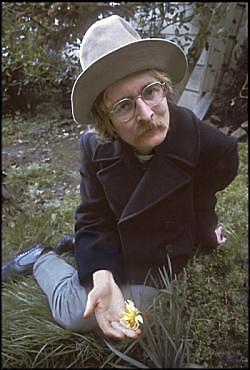
Richard Brautigan
b. Jan. 30, 1935
photo by Erik Weber
1967 Levi Asher on Richard Brautigan
Literary Kicks
All Watched Over by Machines of Loving Grace
Richard Brautigan
I like to think (and
the sooner the better!)
of a cybernetic meadow
where mammels and computers
live together in mutually
programming harmony
like pure water
touching clear sky.
I like to think
(right now, please!)
of a cybernetic forest
filled with pines and electronics
where deer stroll peacefully
past computers
as if they were flowers
with spinning blossoms.
I like to think
(it has to be!)
of a cybernetic ecology
where we are free of our labors
and joined back to nature,
returned to our mammal
brothers and sisters,
and all watched over
by machines of loving grace.
_______________________
Bad Apple
It's time to face the human cost of my Apple addiction -- and yours.
Crawford Kilian
TheTyee
26 Facts About the Awful Conditions Where Your Gadgets are Made
alternet
_______________________

photo - mw
_______________________
We Who Are Left Behind:
Poetry as Testimony in Derrida and Celan
Matthew Landis
To write is to arrange language under fascination and, through language, in language, remain in contact with the absolute milieu, where the thing becomes an image again, where the image, which had been allusion to a figure, becomes an illusion to what is without figure, and having been a form sketched on absence, becomes the unformed presence of that absence, the opaque and empty opening on what is when there is no more world, when there is no world yet.
-
Maurice Blanchot, “The Essential Solitude”
Poetry has a few distinct features that make it fertile ground for interrogating writing and the layers of hidden meaning, collective wishes, and unspoken associations which saturate it . Rather than a concern for grammar and syntax, it provides it’s own unique ideas about form. The sonnet, the ode, the villanelle, aleatoric writing, oulipian constraint, conceptual poetry, Projective verse --the language of any poem is replete with supplemantarity, departures, presuppositions and cognitive and aesthetic fissures and fissions. The devices associated with these formal paradigms, when deployed in a poem, can refer to several layers of meaning and association, the literal image or supra-textual ideogram, a narrative line or a paratactic break. And despite the variations on form and the diversity of content, any of these devices do not lessen a poems discursive or communicative qualities (no matter how they might be re-worked, masked, or undermined). Even an attempt to obfuscate meaning and to challenge notions of legibility communicate something about our understanding of language and signification. Even a blank sheet of paper folded into a bottle carries a message....(more)
_______________________

photo - mw
_______________________
Locked in the Ivory Tower:
Why JSTOR Imprisons Academic Research
Laura McKenna
atlantic
via Tom Matrullo

photo - mw
_______________________
Five poems
from Sakra Boccata
José Antonio Mazzotti
Translation from Spanish by Clayton Eshleman
presented by Jerome Rothenberg
10
The solitude of the mirror does not recoup its expectations
Like the Tunnel of Time it’s a trunk that swallows whatever meat
It offers itself as a sacrifice it’s a trunk
Viscous and fragrant with sweat from the past
Painted with golden bodies it recovers its own life
It remembers labyrinthine cities
On the bank of a muddy river
It ventilates the end of summer and searches for clams
At the edge of a dry abyss
Its steps lead it through churches
Erect as nipples and at their doors it descends
Into the woods of the centenary bones
So much death and no power at all against life
The mirror changes colors
It illuminates from the doorway the purple mantle
Of the Virgin of Candlemas
Oh Saint Mary Mother of God shelter your little lambs
Who seek to perpetuate themselves in the mirror
Oh Saint Maria Mother of God
You yourself
Who with the Holy Ghost
Gleamed one night before the copper
Cauldron
...(more)
_______________________
on Instagram
James Luckett
consumptive
... Instagram offers a relatively unencumbered mechanism to readily participate in a radically differing vista: the quotidian. to peruse a nexus of Instagram connections and to contribute your own photographs to that well, is to play a part in the real time accumulation, a steadying (re)valuation, of some of what gets us, singularly and together, through each day: friends, family, pets, places and food; something beautiful, something funny, something seen, and something done. it is in this way that the common practice of judging the relative merit of an individual photograph falls flat in the face of the Instagram interface. for the import of Instagram is in the very fact of each photograph having been produced and of the near-instantaneous shared profusion of countless such photographs across a network of exchange in which the legal tender is ♥ and minds [ie comments] and the reward, irregardless of the likes, is a reinforced sense of identification. every photograph is a shiver not unlike your own....(more)
_______________________
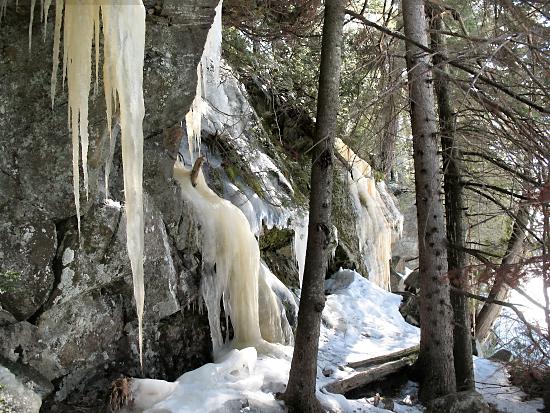
photo - mw
_______________________
Jerusalem & Albion; or, Maze & Barleycorn
Henry Gould on Eliot, Ashbery, Beer, and Mazer
The Critical Flame
If there is, or could be, a center of American poetry — a suspect, much-derided supposition — then John Ashbery, needless to say, lives at or near it. Ashbery: presiding spirit, native genius! That courtly gent, whose arctic blue eyes, disappointed mouth, and eagle beak, convened for the camera, curiously resemble portraits of T.S. Eliot in old age. Ashbery's parasol-like plumage spreads a kindly shade over more recent laboring; his generous blurbs brighten the back pages of scores of advancing young upstarts. The work of two of the most promising, Ben Mazer and John Beer, reveal a substantial debt to their mentor — combined with the influence of an earlier poet, lurking behind both as he does behind Ashbery: that is, yes, Eliot, old Possum himself.
How can we characterize this influence, this dual presence? Like nesting Russian babushka dolls, or those host-spirit figurines from Téotihuacan, the integral stance of a poetic forerunner — mind and heart, worldview and style — threads itself amid the aspiring weft of his or her followers. So before reviewing the work of Mazer and Beer, we will try to take a preliminary measure of their exemplars.
An argument can be launched that poetry in America — and perhaps in general — is born and subsists in a state of fundamental dissonance with, and deflection from, its own milieu; that the work which is finally authorized as permanent and classic is in fact that which is most at odds with its village, off-kilter; that what proves to be most whole in the long run seems, at first, most bent and broken. Whitman and Dickinson, Thoreau and Melville, all to some extent fulfill this pattern; moreover, T.S. Eliot, Wallace Stevens, Hart Crane, Elizabeth Bishop, and Ashbery all do as well. ...(more)
The Critical Flame
Volume 2, Issue 17 | January-February 2012 Henry Gould - HG Poetics_______________________
On The Philosophical Styles Of The Times: [pdf]
Some
Questions Concerning The Meaning Of Deconstruction
Adrian Costache
Abstract:
The present paper deals with the philosophical styles of the hermeneutic project and deconstruction and tries to answer the question whether there really is, as Derrida argues, a fundamental difference, even an opposition between them. In this sense, taking the questions Derrida addressed Gadamer in their famous Paris encounter in 1981 as a clue, the author retraces the fundamental articulations of deconstruction, descending from Derrida?s own description of the idea to his actual deconstructive practice, and shows that the presupposition Derrida takes as separating the hermeneutic project from deconstruction is actually one these two share in common.
Journal for Communication and Culture 1, no. 2 (Winter 2011)

photo - mw
_______________________
Winter
H. L. Hix
from "The God of Window Screens and Honeysuckle"
Stubble rows, four matte, four shiny in morning sun,
show the combine’s direction. What can be preserved
must be preserved as some self other than its own.
Bent cattails mimic stubble in the frozen pond.
Suet nearly gone, chickadees cling upside down
to the feeder. Above it, a hedgeapple wedged
between branches since fall. Past that, changing direction
at once, fast as mackerel, a thousand blackbirds.
Skaters on a pond, we fall into what we know,
drown in disorienting light before we freeze.
In angled afternoon sun, the fence’s shadow
caresses the snow’s contours like tight-fitting clothes.
Even when grass greens to re-enact spring, the snow
will linger, longest in the shadows of houses.
H. L. Hix at the Poetry Foundation and the PIP
H. L. Hix - four poemsdrunken boat.....................................................
“Checking One Belief Against Another”:
A Conversation with H. L. Hix
Karen Schubert
agni
(....)
Maybe I would sit and wait for inspiration if I thought I were a divine emissary or the darling of the muses, but all evidence points to the contrary, so I think of poetry in fairly blue-collar terms. Part of what the obsession implies is that I “keep at it.” Poetry feels to me much more like old-fashioned hard work than it does like a visitation from above. There’s plenty of ambient material, but like soil it needs to be worked if it’s going to produce what you want it to produce, or at least that’s been my experience.
(....)
KS: Recently, I admitted to a philosopher, a poetry-loving philosopher, that I had a long-standing desire to study philosophy, and he steered me away on the premise that it would ruin my ability to write poetry. Do you think there’s anything to the warning?
HLH: I have to hope not, since my graduate degrees are in philosophy, not in writing or in literature! But I think some better grounds than my desperate hope could be offered for regarding with some skepticism your friend’s advice.
I’d want to contest that idea by posing an alternative to the conception of poetry and the poet on which it appears to me to depend. Studying philosophy could ruin one’s ability to write poetry if the poet were an idiot savant, and poetry the result of some version of “inspiration” or “genius” susceptible to corruption by rationality. Or it could ruin poetry if poetry were essentially decorative, if it were just prettified language, and if philosophy by imposing dry reason shoved beauty out. But I doubt that either of those views, or any similar view, is true. I doubt that reason and beauty are mutually exclusive (and in support of my doubt would cite such conjunctions of reason and beauty as our counting “elegance” as one criterion for a mathematical proof). I myself believe that poetry arises from depth of knowledge or intensity of experience or acuity of attention, not from some isolated inner wellspring that would be poisoned by contact with the world. Consequently, I suspect that, all else being equal, the more a poet knows about anything (philosophy, nuclear physics, farming, geology, music, appliance repair, SpongeBob, medical imaging, differential calculus, whatever) the better for her or his poetry. I can’t think of any knowledge that would corrupt a person’s ability to write poetry; to put this in the opposite way, I doubt that the ability to write poetry is so fragile that it can be harmed by learning.
That advice also echoes something I’ve heard each time I’ve taught an introductory-level poetry writing course: “I don’t read other people’s poetry because I don’t want to corrupt my own style.” But that takes for granted both that style is the single most crucial element of poetry and that one’s style is innate. I doubt both premises. My own experience, and what I can infer from any evidence I can gather, suggests that style (or voice, another term sometimes used in the same beware-of-corruption approach) is a composite, something that one constructs rather than something that one receives. I want to say that poetry has to do more fundamentally with how one listens than with how one speaks or writes, and that philosophy (like any number of other inquiries — math, geology, etc.) can help one listen more acutely.
All that said, it’s worth remembering that Wittgenstein reportedly warned his students away from philosophy, period, not only if they were concerned for their poetic abilities. So whether or not you take your friend’s advice, he’s got good company in offering it!...(more)
_______________________

The Valley Thick with Corn
Samuel Palmer
b. Jan.27, 1805
_______________________
Babel No More
The Search for the World’s Most Extraordinary Language Learners
Peter Constantine
reviews The Art of Mastering Many Tongues by Michael Erard
How is it, Erard asks, that certain people are able to accumulate what for the average person is a daunting number of languages? What are the secrets of polyglots who can master 6, 26, 96 languages? What are their quirks and attitudes? Are their brains wired differently from ours?
_______________________
Oxford Scholarly Editions Online
“The text that scholars read matters everything to them because all their interpretations are based on what’s in the text. And so if the text is defective, the interpretations are going to be affected.”
In a new series of videos from Oxford University Press, Michael F. Suarez, S.J. talks about the importance of the scholarly edition and its evolution from print to digital.
_______________________
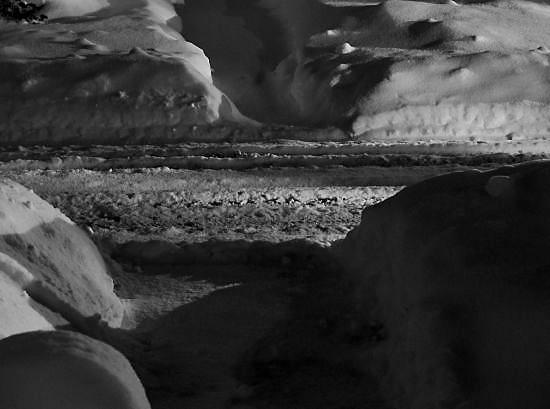
photo - mw
_______________________
Helping Transport Me There Today
Robert Gibbons
Time Capsule
(....)
Talk about one observation following another in rapid succession Rimbaud Olson Davenport. In the middle of one letter he says he just got off the phone with Hallam Movius, expert on Acheulean stone tool making culture reaching back to the Lower Paleolithic, the subject Guy takes up toward the end of his essay “Olson.” Guy was never afraid to make one wild conjecture after another. Kept things moving, as he & Olson believed all things do, including stone. Their molecules & meaning. This is where Guy sends me today: to Olson’s Volume Three, where Guy says, “Throughout these last Maximus poems Olson keeps gazing at the offshore rocks, especially Ten Pound Island.” It’s a volume made heavier over the years strewn with bookmarks & jottings. Look, open it anywhere, ha, a dried elm leaf from Cape Ann marks the page where Olson underlines “necessary woman” addressing the geography & spirit of Gloucester herself, begging her “not go away”. Now, the NYC DJ resorts to Dvorak’s My Home, Op. 62, Overture, helping transport me there today
...(more)

photo - mw
_______________________
The Scholar’s Art
Ange Mlinko, reviewing Susan Stewart's The Poet's Freedom: A Notebook on Making
la review
scroll down
(....)
... there is something about poetry — about language use itself — that sits uneasily with “freedom.” Maybe it’s the terror of babble (the verbal mode of insanity, dementia, and catastrophe). Maybe it’s that for tens of centuries, scribes and grammarians have been mainstays against the cultural losses — and dysphasias — incurred by history: losses of manuscripts, of entire languages. They have also been the ones to sniff at an improperly used meter, a “shapeless” ode, or a qasida that seemed just “a string of pearls,” all rhyme and no reason. Grammar is hard to master. Meaning is easily lost. To mess with it, to mess with language, to play with it (much less play with it without a net) drives pious types bonkers. And on the other side are the ones who have played with language relentlessly, also for thousands of years, the rhymers, punners, riddlers, and innuendo-peddlers who have simultaneously performed the shamanistic duties of the bard: keeper of the culture’s stories, its knowledge, its word-hoard. Frivolous and serious, mischievous and magisterial, poets play both sides of the coin of freedom — heads they study (“the scholar’s art,” Wallace Stevens called poetry), tails they frisk. If freedom and poetry seem paradoxical, freedom and poets are all but identical.
...(more)
via the page_______________________
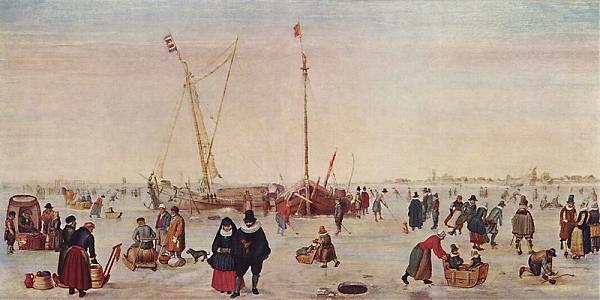
Hendrik Avercamp
January 27, 1585 (bapt.)
_______________________
Boredom in the Charnel House
Theses on ‘Post-industrial’ Ruins
John Cunningham
variant
“Our capital of misery remains intact down through the ages; yet we have one advantage over our ancestors; that of having invested our capital better, since our disaster is better organised.”
-
E.M Cioran, A Short History of Decay
1/ Suggestive Boredom
A friend recently sent me a poem that explained his dissatisfaction and boredom with urban decay and industrial ruins. He wrote much of the poem via one of the automatic text generators that often give the best lines:
“Sick of ruins/ sick of meaning of ruins/ ruined/ decay/ blight/ derelict/ poetry/ heavy bricks/ getting heavy/ sick of work/ getting sick/ labour history/ dead city/ history dead/ city labour/ dead city/ invading ruins/ my apologies/ my theft/ sick of poverty/ sick of ruins...”
(....)
For something as ephemeral as the ruin – the slow decomposition of spatial form in time – the best approach is a fragmentary one. The following is a series of provisional theses upon the decomposition of the contemporary ruin grasped through image and text. In line with this ephemerality and the over determination of everything in spectacular capitalism the following should be viewed as theoretical fictions, transitory attempts to formulate concepts of what is falling apart. This is the first thesis: ‘ruins boredom’ is a suggestive affect in that it is constituted by and through the contemporary metropolis. Walter Benjamin, connoisseur of the arcades – the ruins of 19th century commodity capitalism – wrote that, “Boredom is a warm grey fabric lined on the inside with the most lustrous and colourful of silks.” How might boredom with ruins be turned inside out and industrial ruin capital re-invested as anti-capitalist critique?
...(more)
Variant issue 42
_______________________

Boys of the Dumps
South Boston, Massachusetts
October 1909
Lewis W. Hine: Child Scavengers
Tom Clark
Beyond the Pale
_______________________
Terrifyingly real: Poulantzas and the capitalist state
Lenin's Tomb
(....)
Before delving into Poulantzas' theoretical innovations, I must make a note on his method. As he said in his critique of Miliband, any historical materialist approach to the capitalist state must clearly state its epistemological criteria in order to properly situate the concrete historical data it works with. Absent this, it becomes an exercise in empiricism. His own works, particularly PPSC (Political Power and Social Classes), are to a very large extent concerned with outlining these protocols. His approach, as such, has been taxed with the stigma of 'formalism' and (pace Miliband) 'hyper-abstractionism'. The burden of this criticism is that Poulantzas spent more time parsing texts from the marxist canon and arguing through their implications, than examining concrete state formations. This is not entirely unfair, and to the extent that it is true, Poulantzas was being typically althusserian: a close, symptomatic scrutiny of texts being the modus operandi of the Althusser Circle. But the point is overstated. The survey of the typologies of the capitalist state in PPSC, for instance, largely draws on current sociological and historical research. The argument about the ambiguous role of state personnel in SPS (State, Power, Socialism) draws from the immediate experience of May 1968 in France. Moreover, there is something praiseworthy in Poulantzas' re-evaluation of first principles, the painstaking clarification of concepts. Though this responded to concrete political problems, usually crises - of Greek communism, of democracy, of marxism, etc - his response was far from intellectually defensive. He took theoretical risks in order to make marxism adequate to the present. Only by doing so is it possible to make any sort of progress....(more)
State, Power, Socialism
Nicos Poulantzas mediafire pdf
The Poulantzas Reader: Marxism, Law and the State
Edited by James Martin
mediafire pdf
_______________________

The Dreams of Dr. Plague
Takeo Takei
1924
50 Watts
_______________________
Haptics, Mobile Handhelds, and other "Novel" Devices
The Tactile Unconscious of Reading across Old and New Media
Rachel Lee
ctheory
(....)
I wish to frame Taussig's essay (Tactility and Distraction, 1991) as part of a broader theoretical movement to shift the question for academic criticism away from vision and semiotics -- aka the search for fuller meaning, fuller representation by way of exposing the hidden meaning and bringing it to light -- to tactility and affect -- the connecting with the magic or enchantment of a material object's or phenomenon's intensity, the inquiring into the efficacy of an action or event, and the mapping of how such efficacy is enacted and circulated. The "capitalist mimetics" of advertising, and, interestingly, the pedagogies of preschool education, become exemplary of fields already way ahead of the game, so to speak, in mulling over these questions.
...(more)

photo - mw
_______________________
Forest Of Europe
Derek Walcott
b. Jan. 23, 1930
The last leaves fell like notes from a piano
and left their ovals echoing in the ear;
with gawky music stands, the winter forest
looks like an empty orchestra, its lines
ruled on these scattered manuscripts of snow.
The inlaid copper laurel of an oak
shines though the brown-bricked glass above your head
as bright as whisky, while the wintry breath
of lines from Mandelstam, which you recite,
uncoils as visibly as cigarette smoke.
"The rustling of ruble notes by the lemon Neva."
Under your exile's tongue, crisp under heel,
the gutturals crackle like decaying leaves,
the phrase from Mandelstam circles with light
in a brown room, in barren Oklahoma.
There is a Gulag Archipelago
under this ice, where the salt, mineral spring
of the long Trail of Tears runnels these plains
as hard and open as a herdsman's face
sun-cracked and stubbled with unshaven snow.
(....)
From hand to mouth, across the centuries,
the bread that lasts when systems have decayed,
when, in his forest of barbed-wire branches,
a prisoner circles, chewing the one phrase
whose music will last longer than the leaves,
whose condensation is the marble sweat
of angels' foreheads, which will never dry
till Borealis shuts the peacock lights
of its slow fan from L.A. to Archangel,
and memory needs nothing to repeat.
Frightened and starved, with divine fever
Osip Mandelstam shook, and every
metaphor shuddered him with ague,
each vowel heavier than a boundary stone,
"to the rustling of ruble notes by the lemon Neva,"
but now that fever is a fire whose glow
warms our hands, Joseph, as we grunt like primates
exchanging gutturals in this wintry cave
of a brown cottage, while in drifts outside
mastodons force their systems through the snow.
...(more)
_______________________
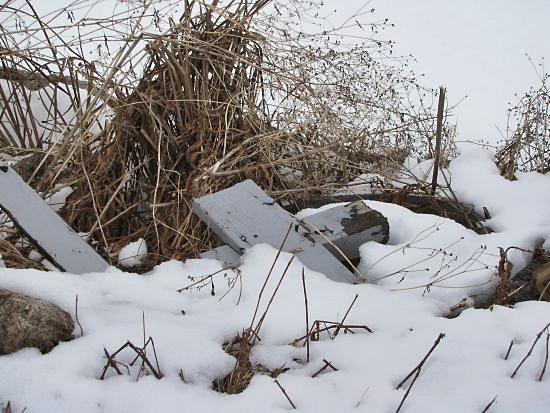
photo - mw
_______________________
"Speech is the fountain..."
John Latta
(....)
Williams’s enormous doubt, and doubt’s vacillatory burdensomeness. Hugh Kenner—in 1953, in “A Note on ‘The Great American Novel’”—notes how “the American language, or the part of it that interests Williams, is distinguished by a sort of amnesia:
Though their colloquial vocabularies are restricted, their syntax simple, and their speech-rhythms the reverse of Ciceronian, Americans don’t utter a gelatinous Basic English. They have rhythmic and idiomatic means of concentrating meaning in these counters, shifting the burden of the sentence with a certain laconic grace from word to word, which falsifies the unthinking novelist’s assumption that the way to extract the unuttered meanings of American experience is to assist these pidgin gropings with the fuller cadences of European prose. European prose, when it attempts to grapple with American material, yields nothing but suave cliché.
Kenner quotes the “European voice” at the beginning of Chapter XI:
Eh bien mon vieux coco, this stuff that you have been writing today, do you mean that you are attempting to set down the American background? You will go mad. Why? Because you are trying to do nothing at all. The American background? It is Europe. It can be nothing else . . .
Kenner’s argument: “This mind”—the European one—“thinks in phrases, not in words: the upward lilt between its punctuation marks is the signature of a habit of apprehension shaped by Latin prose. A European would have imparted a more elegant rhythm to the answering sentence, which comes with Williams’ own unmistakable flatness: As far as I have gone it is accurate.”
Small fogs in retreat. “Pretense to integrity an empty shell.” Bah. A cur’s defiant intent (“nothing to say”) to avoid, at least, inaccuracy.
...(more)
_______________________

photo - mw
_______________________
from Revelator
Ron Silliman
dog barking emerges from barn
but won’t approach, such boundaries
visible to the mind but
not physical at all, swan
with a broken wing adopts
small town pond, adapts, adept
at avoiding all leashed dogs
as they pass, as we
far less permanent than this
giant oak not toppled, atop
wch lone raven stalks, wind
rendered visible by the trees
two cardinals buffeted in flight
red messengers their floating text
peeps by, I spy, eyes
pie, terns skim over water
predusk glare over the Chesapeake
blue heron solitary, standing still
osprey’s nest looks huge, hum
means mosquito right at ear
rubber soles atop hard wood
screech, scratch, itch, each, two
common terns atop a post
implies a pairing, Jack Russell
terriers under foot but Jasmine
sad-eyed black poodle plays fetch
hard rubber chew toy wet
with success iced tea season
is upon us ...
...(more)
shampoo 39
_______________________
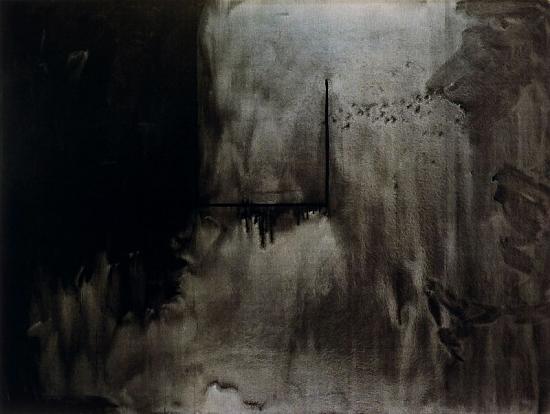
ln Plato's Cave
1972
Robert Motherwell
b. Jan. 24, 1915
_______________________
Tumbril Time!
Alexander Cockburn
A tumbril (n.) a farm cart often used for carrying manure, also to carry prisoners to the guillotine during the French Revolution.
Any headline modeled on “It’s the economy, stupid.” This tedious phrase derives from the Clinton campaign of 1992, and is still echoing on opinion pages 20 years on. To the tumbrils with it!
“Well…” , as in constructs like “His performance was.. well… frankly bad.” Equally awful is “…er”, as in “Is Angeline Jolie a great actor? Er… no.” The British are particularly keen on this piece of stylistic coyness.
“Staunch”, as so often used to describe right-wingers: “a staunch Republican,” “a staunch Conservative”, though not I think, “a staunch fascist.” I see left writers using this phrase freely about Republicans and Conservatives. Don’t they know that “staunch” carries the aroma of unstinting, courageous loyalty. It’s an honorific. How about “fanatic Republican”? “crazed Conservative.” No rightwinger would talk about “staunch liberals” – admittedly an oxymoron, just like “staunch Democrat.” Now, there really are staunch pacifists. Save the word for them.
Michael Donnelly offers “At the end of the day,” which, I need scarcely remind you, is the hour when the fat lady sings, after the rubber has met the road. The fat lady line was first popularized in George H.W. Bush’s run for the Republican nomination in 1980. When he finally threw in the towel, the press corps hired a fat Valkyrie with a horned helmet to rush up to him and sing at the top of her voice, waving a trident.
From Jean-Pierre Duboucheron: “Bad guys.” Spot on, Jean-Pierre.
From Sean Dunne in Ireland: “this ain’t my first rodeo” ; “just sayin’”; “Really.” True, one does see the terse “Really” all too often. Time for the final haircut.
“I would like to request that you consign one more word to the tumbrils. And that word is ‘stakeholder.’” Vukoni Lupa-Lasaga. Happy to oblige, Vukoni.
...(more)
via Owen Paine
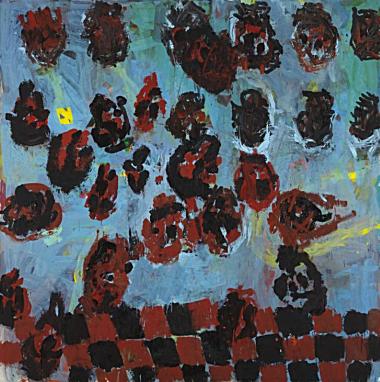
Folkdance Melancholia
1989
Georg Baselitz
b. Jan. 23 1938
_______________________
Only after philosophy will he live. Only when he has brought philosophy to an end.
A little kindness. That's what he looks for.
What he wants: simple, direct communication, he says. To speak of ordinary things.
He is touched by platitudes. The porter says, 'How are you today, sir?', with a friendly wink. The cleaner: 'Am I disturbing you?' There is nothing more moving, he says.
Wittgenstein Jr: Normal people are are a balm. And on another occasion, We must be normal, normal.
Life is very close to us, he says. It is almost here.
- Wittgenstein Jr
_______________________

photo - mw
_______________________
from
Lanthanum 1 - 8 [pdf]
Henry Gould
3
Each wave curls its own limestone Dover cliff
of snowy foam. Each day a microcosm.
Holds tight its mystery, beneath the chasm
vault of milky sky. My little skiff
with its keen keening keel sings blind
into the wind. . . I ride along her sea-road,
blinded too. Eros, playing with his golden
cobalt ball, unbalances mankind –
love stung me in the eyes, and swelled her sails
(away from home). Memoirs of a Vagabond
(foolish desire). Confessions of a Fond
Frog-Pond (a little touched). The Voice that Fails.
A mute remorse, a comprehending silence.
Foot-pedaling gymnast, pianissimo
satyr (impaired biped, recycling) – O
animale compagnevole – get thee hence.
Ice-boles in the trees are tears, glinting
in low December sun. If there be Life
Renewed (for such as Berryman, Henry) – if
there be Someone in the Whisper (hinting,
glancing) – would be like this sunlight
through the icebound branches – would be
happy ending to a Winter's Tale (of misty
breath – Look there, look there!). . . all right,
all right. Beyond these galaxies of Sorrow,
Shame and Fear. . . a turning wonder, there –
in the beginning – with a childish air. . .
a choir that shanties through the winter snow.
Poetry - Henry Gould
free pdf. versions, linked at the Brown University Library catalog.
HG Poetics
_______________________
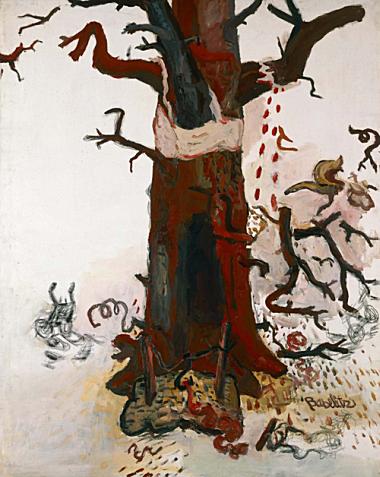
The Tree
Georg Baselitz
1966
_______________________
Bazooka, Night Watering, and Admonition for My Children
Ange Mlinko
nonsite
Bazooka
You hear a song, say, at the Ió-popoi festival
holding that a new addition to the alphabet
has been fashioned by the magus, Epicharmus.
He appeared at court before the tyrant
and his invention glowed, like smaragdus
then leapt off tongues like popoi, dah!
The other one—that Pindar—got his comeuppance
when Korinna laughed at him: "One should sow
with the hand, not the whole sack."
Yet he continued to pour everything into that ototototoi
to which he refused to give a false bottom:
His "circumlocutions, allusive references, metaphors,"
not to mention his sudden curtailments
and digressions, served a "highly artificial idiom."
"Dissonance;" "big, long words;" "grand rhythms;"
these made him famous, and his complex metrics
gave his work the impression, as Horace said,
of a rushing river, "freed from rules."
An aristocratic nature does not like to be constrained
to the fewest syllables. His subjects encompassed
gods and men and horses, all victorious.
As a dog rambles, its nose a coquette granting
equitable attentions to the savory and fetid,
I sift for truth among these airs
much as I define necessary by the yardstick
of my own pleasure: Cold weather sweeps down
from the articulate clouds, thrilling invisible
peacock feathers from goosebumps,
and the dead man's fingers of a poncho
as I stride across fields of live oak, catch samples.
...(more)
Ange Mlinko (Bachelardette) at Poetry International and the Poetry Foundation
Three poemsAnge Mlinko jacket
_______________________
Valerie Merians and Dennis Johnson of Melville House:
successful small publishers in a conglomerate world.
Tamara Glenny
The truth is that making it as a small publisher in an era of international conglomerates-who themselves tremble at the name of Amazon-is hard if not impossible. As it turned out, it was probably just as well that Merians and Johnson were clueless when they decided to publish Poetry After 9/11 in 2002. Babes in the tangled wood of modern publishing, they stumbled in and never left.
Melville House at ten years old
_______________________
rob mclennan's Top Eleven (Canadian) Poetry Books of 2011!
dusie
_______________________
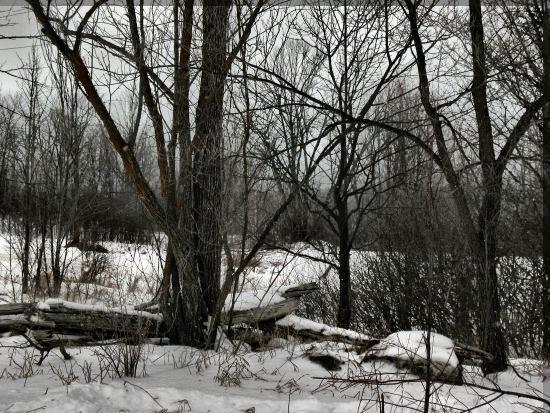
photo - mw
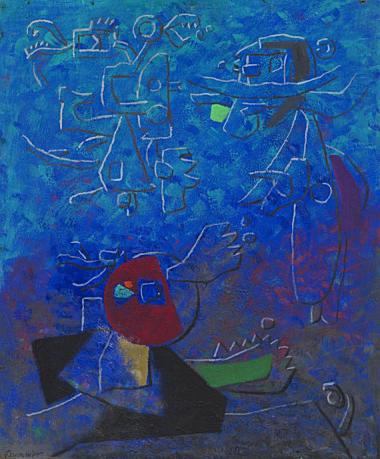
Nocturno mit rotem Segment
1953
Willi Baumeister
b. Jan. 22, 1889
_______________________
Three poems by Osip Mandelstam
translated (and read) by Stephen Dodson
qarrtsiluni
Insomnia. Homer. Taut sails.
To midpoint have I read the catalog of ships:
That long, that drawn-out brood, those cranes, a crane procession
That over Hellas rose how many years ago,
Cranes like a wedge of cranes aimed at an alien shore—
A godly foam spread out upon the heads of kings—
Where are you sailing to? If Helen were not there,
What would Troy be to you, mere Troy, Achaean men?
Both Homer and the sea—everything moves by love.
Who shall I listen to? Homer is silent now,
And a black sea, a noisy orator, resounds,
And with a grinding crash comes up to the bed’s head.
...(more)
_______________________
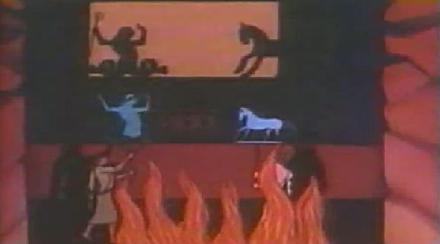
Plato 's cave
Narrator: Orson Welles
Animator: Dick Oden
Music: Larry Wolff
youtube
via htmlgiant
_______________________
(The) Kirkman Guide To The Bars Of Europe
their music, their service, views etcetera
Ken Bolton
FOAM:E
(....)
Orson Welles. I see the Harry Lime figure.
Authentic? In-authentic? Neither.
It was not the point. That is
the Bar San Callisto’s attitude. Is
the Bar San Callisto authentic? Are you
kidding? Is it not? Sure it isn’t. It is
the Bar San Callisto—just as you left it.
I think the Welles figure was Alan Wearne.
I have been astral travelling. It is
the Bar San Callisto—“just as you left it”.
Someone has swept. So the butt-ends
are not embarrassingly in the way, the ‘offing’.
It is itself almost detritus. If Italy
would only clean up its act it would be gone!
Is that fair to say? It may be true.
Berlin has no San Callisto. A San Callisto in Britain
would be fashionable for fifteen minutes.
Then people would move on. Used up. In Paris
it would become dowdy, or sad,
& upgrade & succeed at being something else,
the bar Borgelt or Bougogne or something suggestive
of new cars & insurance. The Bar San Callisto—
the real one, in Rome, exists. Is it ‘a Gilligan
among bars’? No, Steve Kelen. No, its clientele objects
(some, apparently, care), It is not sappy. So who, what?
Watteau’s Gilles, Stan Laurel? No. Yes. I don’t know.
Could you repeat the question?...(more)
FOAM:E - Issue 8
_______________________
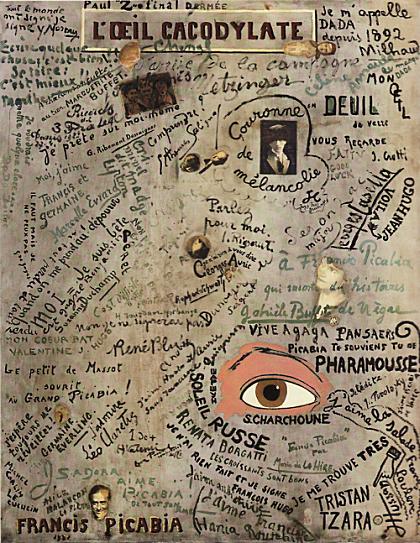
L'Oeil cacodylate
Francis Picabia
b. Jan. 22, 1879
_______________________
Beyond Power/Knowledge [pdf]
an exploration of the relation of power, ignorance and stupidity
Professor David Graeber
LSE Thursday 25 May 2006
Bureaucracies public and private appear—for whatever historical reasons—to be organized in such a way as to guarantee that a significant proportion of actors will not be able to perform their tasks as expected. It also exemplifies what I have come to think of the defining feature of a utopian form of practice, in that, on discovering this, those maintaining the system conclude that the problem is not with the system itself but with the inadequacy of the human beings involved.
(....)
As an anthropologist, probably the most curious thing for me was how little trace any of this tends to leave in the ethnographic literature. After all, we anthropologists have made something of a specialty out of dealing with the ritual surrounding birth, marriage, death, and similar rites of passage. We are particularly concerned with ritual gestures that are socially efficacious: where the mere act of saying or doing something makes it socially true. Yet in most existing societies at this point, it is precisely paperwork, not other forms of ritual, that is socially efficacious.
(....)
Why, then, are there not vast ethnographic tomes about American or British rites of passage, with long chapters about forms and paperwork?
(....)
This essay is not, however, primarily about bureaucracy—or even about the reasons for its neglect in anthropology and related disciplines. It is really about violence. What I would like to argue is that situations created by violence—particularly structural violence, by which I mean forms of pervasive social inequality that are ultimately backed up by the threat of physical harm—invariably tend to create the kinds of willful blindness we normally associate with bureaucratic procedures. To put it crudely: it is not so much that bureaucratic procedures are inherently stupid, or even that they tend to produce behavior that they themselves define as stupid, but rather, that are invariably ways of managing social situations that are already stupid because they are founded on structural violence. I think this approach allows potential insights into matters that are, in fact, both interesting and important: for instance, the actual relationship between those forms of simplification typical of social theory, and those typical of administrative procedures. via Lars Iyer
_______________________
 Wall
Burk Uzzle
via
1 2
_______________________
Traces of the trAce Online Writing Centre 1995-2005
J. R. Carpenter
jacket2
(....)
Between 1995 and 2005 the trAce Online Writing Centre hosted and indeed fostered a complex media ecology: an ever-expanding web site, an active web forum, a local and and international network of people, a host of virtual collaborations and artist-in-residencies, a body of commissioned artworks, the trAce/Alt-X International Hypertext Competition, the Incubation conference series, and frAme, the trAce Journal of Culture and Technology. What emerged was one of the web’s earliest and most influential international creative communities. Its members were diverse, ranging from media-curious workshop participants to artist-in-residencies by some of the most well known practitioners in the fields of new media and digital writing today. What they had in common was that used the internet as a medium and a meeting place, platform to generate, disseminate and debate new media writing writing practices....(more)
trAces: A Commemoration of Ten Years of Artistic Innovation at trAce [pdf]
trAce archive 1995 - 2005
_______________________
A Presidential Epigram
Paul Perry
after Mandelstam
we live without feeling
the border between us
and our feet do not touch the ground
listen -
our voices are accent-less
and the echo of money
is like the sound of rigging in the wind
...(more) The Burning Bush 2
edited by Alan Jude Moore
Paul Perry
_______________________
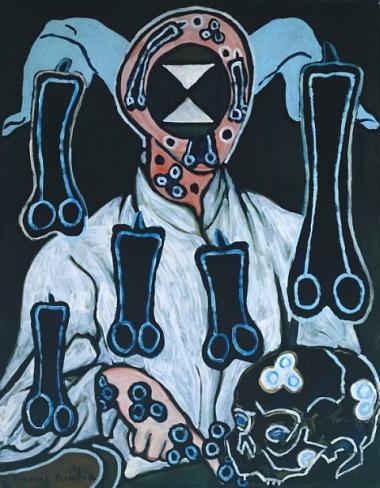
Portrait of a Doctor
circa 1935-8
Francis Picabia

La Femme 100 Tetes
Eric Duvivier
1967
adaptation of Max Ernst's collage book
"La femme 100 tźtes", originally published in 1929
youtube
_______________________
Territory is not Map—
rob mclennan
that is, for me, a marvelousness—the great paradigms of our meanings shift—“God, self, history, and Book,” to use Mark C. Taylor’s arrangement of them, shift—that is to say, in the Anglo-Saxon meaning of the word shift, divide and separate—and thus, because they are never still, they meander, like persons who have come upon a territory—“Map is not territory,” in a phrase that delighted Jack Spicer and me, when we found it something like 45 years ago in Alfred Korzybski—and equally, territory is not Map—
Robin Blaser, “Hello!” —The Recovery of the Public World
In terms of agency, capability; ice pellets form a naked stretch
of frozen purpose. Does not fall harmless, house-organ bled,
the myriad agencies of winter. “Write what
you know” evolved into “Write
what you don’t know, otherwise you’ll never learn.” Appeals
are flecked, inelegant, locked; a single role, played
instrument. I must see where the fragment licked, combustible.
The only instance gives me credit. As if by chance,
by which the short lines of our meaning textured, breath-took,
blended or combined. Attention spans economy. Majesty, the nature
could not last. Articulate the sparrows, seasoned geese, the traffic-calming
speed bumps. A station at the banks, we were not progress. ...
...(more)
On Barcelona
via Crag Hill
rob mclennan at EPC
_______________________
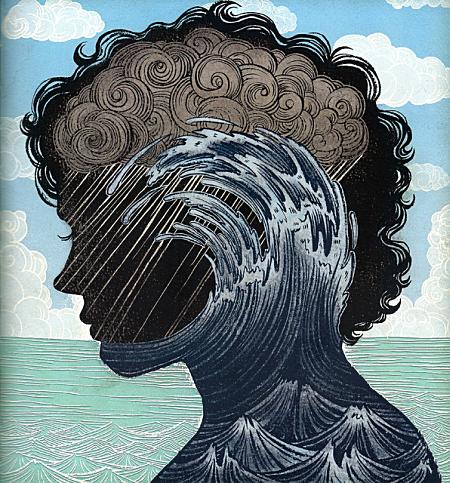
Fear
(2007)
Yuko Shimizu
BibliOdyssey
Yuko Shimizu
_______________________
Sound and meaning
Tarja Roinila
Translated by Emily Jeremiah
Books from Finland
(....)
Let us imagine for a moment that prose and poetry are clearly distinguishable from each other. The translator of prose can imagine that she is translating the meaning of the text, coding it through another system of signs. She can abandon the letter of the source text and convey its spirit. The poetry translator gets entangled with the letter. The more the text experiments and renews form, the more she does this. In a poem, meaning and letter are inseparable. Or as the French poet and philosopher Paul Valéry puts it: poetry is an incessant hovering between sound and meaning.
It is often said that poetry translation is impossible for this reason: one cannot translate poems because one cannot translate letters. The translator has to let go of the letters of the original, and then the poem is destroyed.
But one can work with the letter. This is not a matter of copying or reproducing, but rather of ‘drawing attention to the games the letters play’, as the French translator and theorist of translation Antoine Berman writes.
A translated poem does not come about through one person building the base, the other adding the decoration, because poetry is not simply normal language dressed up. That is why Bracho and I sit at a table together, learning Nordellian....(more)
_______________________
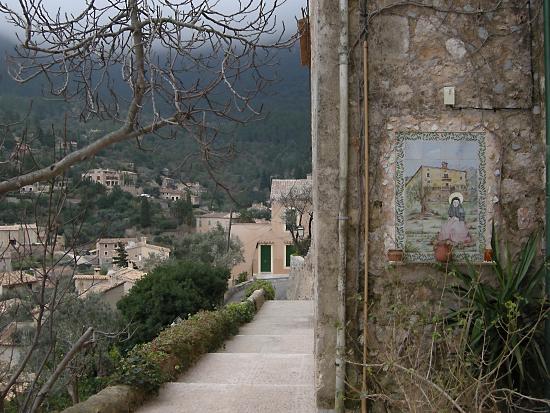
Deią
Studiolum
Poemas del rķo Wang
_______________________
Don't Break the Internet
Mark A. Lemley
Stanford Law School
David S. Levine
Elon University School of Law; Stanford University - Center for Internet and Society
David G. Post
Temple University School of Law
Stanford Law Review Online, Vol. 64, p. 34, December 2011
Social Science Research Network
_______________________

Sophie Taeuber and Erika Taeuber
in Kachina costumes made by Sophie
Zurich 1922
Sophie Taeuber-Arp
19 January 1889 - 13 January 1943
 SOPA Strike!
No 2 SOPA
Doc Searls
_______________________
What is the state of critique today?
A conversation with Anders Johansson, Sharon Rider and Malin Rönnblom
Translation by Emily Rainsford
First published in Fronesis 36-37 (2011)
Is what is taken for critique today genuinely self-questioning or merely the confirmation of the moral consensus? In the neoliberal culture of the audit, has critique been deprived of its role as check on ideology? And does preference for impact-oriented research produce political compliance rather than independent critical thought?
- eurozine
Sharon Rider
(....)
I would like to pose the question: must one be insane or obsessed to think for oneself? The point of critically examining our own society must ultimately be that one honestly feels ill at ease, at odds, with something about the form of life that it institutionalises and embodies. If one is seriously in doubt about something, one cannot at the same time be an ardent and outspoken proponent for the very thing that one is calling into question. Rather, one becomes doubtful as to the very grounds upon which is standing. All talk about alternative visions for a future society must begin here, with our own failings and misgivings about who we are. I realize very well that many people, perhaps most, will find this sort of reasoning romantic, dreamy, escapist – in Marxian terms, bourgeois ideology. After all, on what basis can we enact change with self-reflection as a starting point? My answer, however unsatisfactory, is that this is precisely the question that we should be asking as radically beginning (in the philosophical sense sketched above) cultural critics. For this is the heart, the very stuff, of critique.
...(more)
_______________________
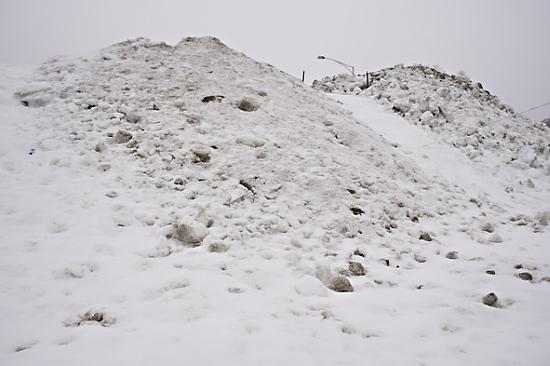
Slowed Breath: The Disrupt
Gregory Ackland
2011
via
_______________________
Just Because You’re Paranoid
Timothy Burke comments on Writing History in the Digital Age
Easily Distracted
(....)
There are signs of that at times in work that self-identifies as digital humanities, and it’s something of the same split move we saw in game studies, between those that would like to create a new, separate disciplinary project and those that would like to safely domesticate “frontier” subject matter for incorporation into the safe metropole of an existing discipline. Digital humanists, however, are both consciously fretful about those possibilities and in many cases ideologically committed to avoiding them. This is one of the main sources of the “meta-ness” and self-referentiality of much DH discussion, which sparked a good deal of tweeting and blogging in the last week, of how to avoid, disrupt or defer moves towards enclosure by disciplines or towards splitting digital humanities off as its own discipline and keeping alive an insurgent challenge to business as usual.
One of the dangers to that commitment is a tendency to invest too much in an abstract imagining of the Other of digital humanism, a sort of pervasive tormenter and antagonist who is everywhere and nowhere at once in the academy, a sort of superset of all academics who are not expressly committed to the use and exploration of digital culture, information technology, open access, and so on.
Some of the practices and structures in academia which are most inimical to the professed goals of many digital humanists are supported largely by inertia rather than strongly felt commitments. That’s actually harder to overcome, but it’s important not to personify inertia or give it more intentionality than it has.
This is not to say that there are not opponents to digital technologies, open access publishing, blogging and so on within the academy. There are. Some opposition is passive or snarky, largely about the comforts of that inertia. Some is much more active, passionate and articulate. I’d rather deal with the latter, because that’s a conversation that can take place largely within the idealized norms of scholarly debate and process. It’s mostly the former, however. That’s where the danger of overimagining an opposition comes into sharpest focus....(more)
Writing History in the Digital Age a born-digital edited volume, under contract with the University of Michigan Press for the Digital Humanities Series of its digitalculturebooks imprint.
_______________________
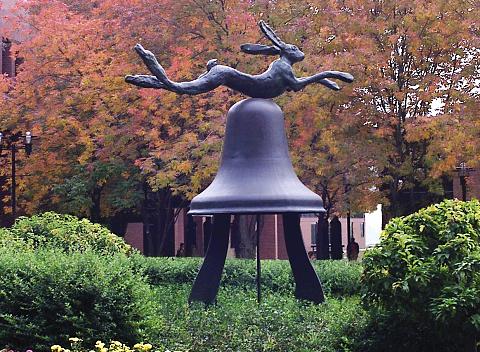
Hare and Bell
1988
Barry Flanagan
1941 - 2009
Nerman Museum of Contemporary Art

photo - mw
_______________________
Two Poems
Catherine Imbriglio
conjunctions
Chāteau Noir Intimacy
For Bradford Robinson
The trope of a tree, the trope of the land that looks out at the tree. The trope that could be sawed off into lumber, the trope with which to build a house on the land. Beyond or through the trope there is always the turning toward it, as even here when I pause to strip a real birch of its bark.
If the turn is silly bussed, then what to make of it. Does it assemble lip-smacking good will for the contested subject. A discarded curl from the torn-off bark. Let me pause to name vehicles with formative, i.e., nursery clown, intentions. Would I want to turn the trope of your fingers into fingers. Would I want to turn the smiling dark into dark.
A form of a pill bug turning the big ships in and out of the harbor. A form of a rhinoceros turning to the wrong kind of mud model. A form of a form sending all forms into reversal. In their reversals, will all forms echo and mrof.
...(more)
_______________________

photo - mw
_______________________
Arbor Vitae
Richard Hoffman
Mnemosyne's Memes
(....)
Our relationship to trees is a conspiracy, literally. We breathe together. It is symbiosis on a grand scale. Every schoolkid knows this. We take in oxygen and breathe out carbon dioxide. In comes the good air, out goes the bad. Trees are our very life support, and we, along with the other animals, are theirs. We sustain one another, we conspire for the common good of carbon based life. It only remains to be said that the “spire” in conspire is, etymologically, spirit, the breath without which we would die, and not only metaphorically.
So I see the relationship of people to trees as a conversation that involves quiet,
attention, listening. What people have always done with breath, with spirit, is make stories, and I have no reason to believe that trees don’t similarly shape their breathing. Trees listen, then they tell their side of the same survival narrative. We have this conversation continuously on the molecular level. When the trees speak they tell me of course of water (they even sometimes make the sound of it quite convincingly.) They also talk about light. When I breathe in deeply in a forest, a light brightens just behind my eyes as surely as I see a canoe when you say the word canoe or conjure my daughter when you speak her name. Trees tell me other things as well; they seem to know me. Sometimes they tell me things that I don’t know I’ve heard until a long time after. Our breathing, I imagine, tells the trees of joy and desire, anger and injury, and is often shaped into the long sighs of sorrow. We tell it all, in every chemical flavor, storytelling virtuosos who by now, after a couple of million years, know how by heart.
...(more)
_______________________

photo - mw
_______________________
Duino Elegies
Rainer Maria Rilke
Justin Erik Halldór Smith
The First Elegy
(....)
It is indeed peculiar to inhabit the earth no longer,
not to exercise skills barely learned, nor to give
to roses, and to other things that promise themselves,
the significance of a human future;
not to be what one was in infinitely
anxious hands, and to leave behind
even one's own name like a broken toy.
Peculiar, to no longer wish wishes. Peculiar,
to see everything fluttering that hung
so loosely in space. And being dead is laborious
and full of catching up, so that one gradually senses
a bit of eternity. -- But all of the living make
this mistake, that they distinguish too sharply.
The angels (it is said) would often not know, whether
they were moving among the living or the dead.
The eternal current always pulls all the ages
along with it through both domains,
and drowns them out in both.
In the end they need us no longer, the early departed,
one is gently weaned of the earthly, as one meekly
grows away from the mother's breast. But we who need
such large secrets, for whom blissful progress
so often springs from mourning--: could we be without them?
The story is in vain, that once in the lament for
Lino's daring first music, barren torpor crept in;
that first in the stunned space, into which an almost divine youth
suddenly entered forever, did the emptiness shift into that
vibration, that now thrills us and comforts and helps.
...(more)
_______________________
That Merciful Surplus of Strength
Draft of chapter one of Lars Iyer's Blanchot's Vigilance (Macmillan, 2005)
Up for a limited time only.
(....)
Kafka does not choose to sacrifice everything to writing; he has no choice. But for what is his life sacrificed? What does he sacrifice by writing? Read his notebooks. Kafka begins story fragments again and again; he does not complete or trouble to rewrite them. They begin and break off. It appears that it is not completion he wants, but something else – that what he writes will never be of any worth and his hope lies in an impossible writing that demands he complete none of his stories. They are sacrificed to a still greater demand. He seeks to unwrite writing as he writes it. It is the attempt to realise worklessness, to put it to work to which his life will be sacrificed.
‘I cannot write’ – ‘you must write’ – ‘I cannot finish a story’ – ‘it is by this incompletion that you will be sacrificed to writing’. Comparing Kafka to Abraham on Mount Moriah, Blanchot notes, ‘For Kafka the ordeal is all the graver because of everything that makes it weigh lightly upon him’; then writes, ‘What would the testing of Abraham be if, having no son, he were nevertheless required to sacrifice this son? He couldn't be taken seriously; he could only be laughed at. That laughter is the form of Kafka's pain’.
(....)
Doubly lost, and commenting on the great refusal to which writing is linked, Kafka comes closest of all to the condition of writing. For isn’t literary writing a lament for what it is not? Isn’t it an experience of a detour without issue, pointlessness itself? Whence the temptation to ally writing to a great political cause, or to give up writing altogether: one to which Kafka often resorts in his diaries and letters, setting out his plans to emigrate to Palestine or telling Janouch of his new habit of undertaking two hours of manual labour each afternoon. But he does not yield to this temptation; writing saves him. From what does it save him? From a life lived outside writing. But isn’t writing precisely the door which will not admit him? Isn’t the way barred by the great doorkeeper with his Tartar beard? ...(more)
_______________________

photo - mw
_______________________
Welcome to Alphaville, Avoid the Ghetto
Aram Sinnreich
truthdig
... most of us carry Alphaville bibles around in our pockets and purses. Yes, they might give us the gift of Angry Birds and allow us to share pictures of our lunch with our 500 closest friends. In some cases, they even help people to coordinate revolts and revolutions. But make no mistake: The world we see through our smartphones is a curated world, and its horizons are constricting, rather than expanding. Though they're often billed as modern-day Diogenes' lamps, outshining the light of day with the light of truth (or "augmenting reality," in contemporary geekspeek), they would be better understood as corporate-sponsored guidebooks to our own lives, keeping us on the prescribed path and off the road less traveled....(more)
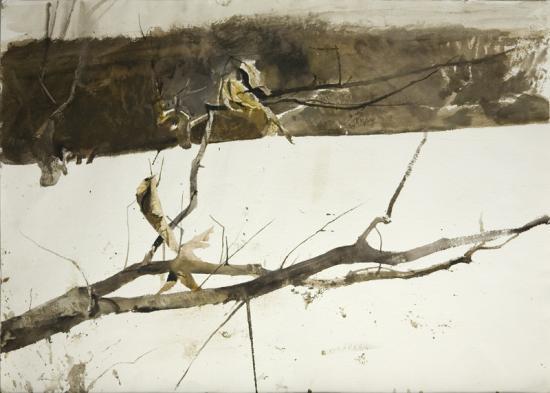
Andrew Wyeth
d. Jan. 16, 2009
_______________________
Draft 74: Wanderer
Rachel Blau DuPlessis
Book I
This the place where hopes had left
their traces, stark in storm,
stoked in “astonishing nights, foreigners among humans,”
whose eye thirl, window whorl they Open Wide
seeking wordth and depth,
if ever, given
ques and querl, this wordth and depth could be,
and want to speak to sight, to sigh and
rage, not for that hour, nor for that place
yet nowhere
unembellished by some trace,
documentary (that and more), witnessing (that
many more) and witless, hurtful, “jesting air”—en-
joined, frozen in mo ti on but not to crumble, rather
stand. This has to stand, inside, longside as
It; and yet is split, is double split, in impulse, turn, and goal.
Still somehow moves (un-
sanctioned? leaden?) fated, stripped,
by road or pathway or through trackless field,
Up hill or down.
What hope then for the wanderer?
Yet and Yet and Yet in place.
Aura of words in a storm face.
There are plenty of reasons to wonder.
A Celebration of the Poetry and Criticism of Rachel Blau DuPlessisPennSound
Rachel Blau DuPlessis at EPC_______________________
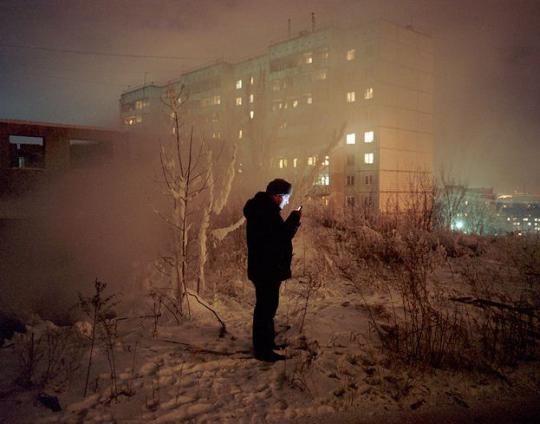
7 Rooms
Photographs by Rafal Milach
guernica Rafal Milach
_______________________
Unkingd by affection?
Robert Duncan
from Poems for Jess, 1952
presented by Tom Clark
One exchanges the empire of one's desire for the anarchy of pleasures.
But pleasures themselves one finds are not domestic.
And the trouble of the soul casts jewel-like reflextions upon the daily surfaces.
One has moved only to a world where the devoted household commonplaces cast shadows that are empires; where the warmth of the hearth is kept alive in a cold that extends infinitely, the dreams of a king, ruthless in his omnipotence.
A plenitude of powers, an over-reaching inspired pretension, an unam sanctum, a papal conceit over all beloved things.
We live within our selves then, like honest woodsmen within a tyrannical forest, a magical element.
Shelterd by our humble imaginary lives from the eternal storm of our rage.
_______________________
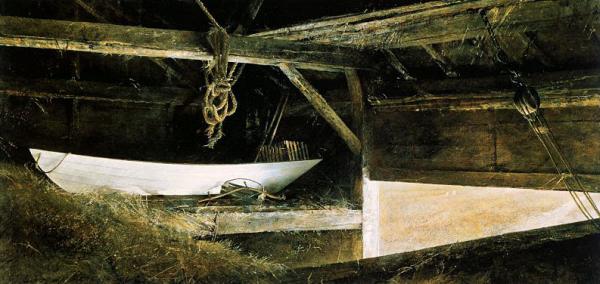
Hay Ledge
Andrew Wyeth
1957
_______________________
Our Weirdness Is Free
Gabriella Coleman
Triple Canopy
(....)
Political operations often come together haphazardly. Often lacking an overarching strategy, Anonymous operates tactically, along the lines proposed by the French Jesuit thinker Michel de Certeau. "Because it does not have a place, a tactic depends on time-it is always on the watch for opportunities that must be seized 'on the wing,'" he writes in The Practice of Everyday Life (1980). "Whatever it wins, it does not keep. It must constantly manipulate events in order to turn them into 'opportunities.' The weak must continually turn to their own ends forces alien to them." This approach could easily devolve into unfocused operations that dissipate the group's collective strength. But acting "on the wing" leverages Anonymous's fluid structure, giving Anons an advantage, however temporary, over traditional institutions-corporations, states, political parties-that function according to unified plans. De Certeau pointedly distinguishes this as strategy, which "postulates a place that can be delimited as its own and serve as the base from which relations with an exteriority composed of targets or threats … can be managed." Anonymous is not bound to any such place, and therefore does not harbor what de Certeau calls "a Cartesian attitude."...(more)
|
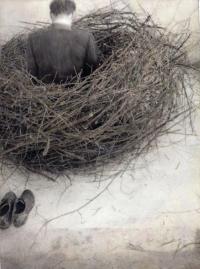
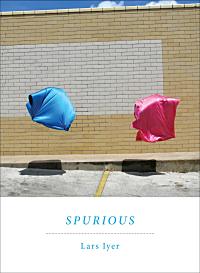


 The Age of Briggs & Stratton
The Age of Briggs & Stratton









































